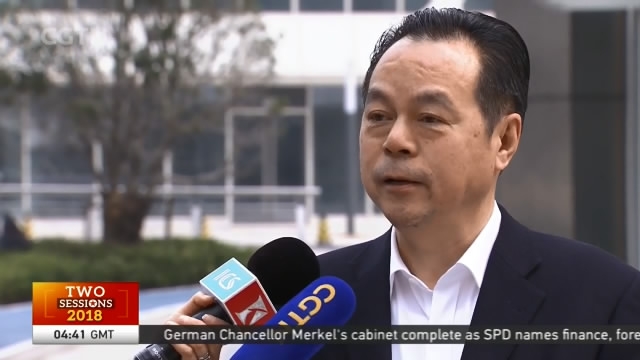
13:33, 10-Mar-2018
China’s Political Season: Legislator from Shanghai advocates cutting red tape for businesses

Cutting red tape for enterprises in China has been a key issue since President Xi Jinping took office in 2013. The country has cut administrative approvals by over 700 items in the past five years. But legislators from Shanghai still seem unsatisfied. Some have made field studies for years, and are ready to make proposals at the National People's Congress. CGTN's Han Peng reports.
ZHANG ZHAO'AN NPC DEPUTY "Shanghai may look modern and international because of its skyline, but what is less visible is that its business environment still lags behind other countries. Red tape makes people with money and ideas reluctant to take risks and open their own business. This year, I'm making a long list of detailed proposals to the National People's Congress on how to cut it. To achieve that, I visited different types of enterprises over the past year."
Zhang Zhao'an has worked as a legislator for over a decade. A renowned economist in Shanghai, he's always meeting with entrepreneurs of all kinds whenever he's not in his office.
ZHANG ZHAO'AN NPC DEPUTY "As an NPC deputy, you need a deep understanding of their demands, both by conducting academic studies and by talking directly to the people."
The firm he's now visiting is a Shanghai-based tech start-up. Its CEO came back to China after graduating from Stanford. But he's not without complaints.
ZHANG ZHAO'AN NPC DEPUTY "This company is a typical 'returnee' start-up, which China wants to attract. But the problems faced by companies like this go beyond the red tape in recruiting foreign employees. As with many other entrepreneurs, our conversation lasted hours because they regard NPC deputies as key channels to voice their complaints and push for changes."
According to a 2017 report by the World Bank, it takes an average 29 days to go through a total of nine stages to register a new company in China. The world's 2nd largest economy ranks 127th in the efficiency of opening a new firm, and 78th in overall business environment.
HAN PENG SHANGHAI "Shanghai aims to become what authorities call 'an excellent global city' by 2035. But Deputy Zhang Zhao'an says the city still needs a lot of reforms, especially on cutting the unnecessary approval procedures for enterprises, to really become a world-class financial hub like London or New York."
Such reforms, Zhang admits, would often mean challenging some government officials' vested interests. Resistance is almost certain. But as he set out to Beijing with dozens of other Shanghai legislators, he said he's ready to fight. Han Peng, CGTN, Shanghai.

SITEMAP
Copyright © 2018 CGTN. Beijing ICP prepared NO.16065310-3
Copyright © 2018 CGTN. Beijing ICP prepared NO.16065310-3